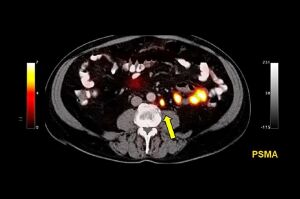by
John R. Fischer, Senior Reporter | August 08, 2019

Researchers at UCLA recommend
PSMA PET/CT over Axumin PET/CT
for locating recurring prostate
cancer
Researchers at UCLA are touting the use of a new imaging method for locating prostate cancer recurrence, compared to the conventional approach.
The team claims in a new study that in the investigational scanning approach, PSMA PET/CT, may offer a better chance of determining the location of recurring cancer following prostate cancer surgery than the current U.S. standard of fluciclovine positron emission tomography, known also as Axumin PET/CT.
"PSMA is an enzyme that is located on the cell surface of prostate cancer cells. The high number of PSMA molecules results in high amounts of ligands binding to this target," Dr. Johannes Czernin, professor of molecular and medical pharmacology at the David Geffen school of Medicine at UCLA, told HCB News. "There is very little PSMA expression in normal cells of the prostate and in other tissues. This is important for imaging because it results in a low background signal. Thus, the target (prostate cancer) to background ratio is very high. The advantage of this high target to background ratio is that relatively small lesions can be detected."




Ad Statistics
Times Displayed: 41633
Times Visited: 1173 Stay up to date with the latest training to fix, troubleshoot, and maintain your critical care devices. GE HealthCare offers multiple training formats to empower teams and expand knowledge, saving you time and money
National Comprehensive Cancer Network guidelines call for using 18F-fluciclovine PET-CT for prostate cancer biochemical recurrence localization following radical prostatectomy, whereas European Association of Urology guidelines recommend prostate-specific membrane antigen (PSMA) PET-CT. Patients who undergo prostate cancer surgery must be routinely screened after for a recurrence of cancer. While recurring prostate cancer following surgery is usually in the area where the prostate was removed (prostate fossa), some cases have found cancer to be outside of it, in areas such as bones or lymph nodes.
By injecting patients with fluciclovine, physicians use PET/CT to track amino acids, which the contrast agent mimics due to their radioactive composition. As cancer cells consume more amino acids than regular cells, the technique helps locate the cancer by showing which cells consume more of the fluciclovine. The prostate-specific membrane antigen (PSMA) method uses the antigens’ protein expression levels to locate recurring cancer by tracking the cell surface proteins due to prostate cancer cells over-expressing a high level of PSMAs compared to normal ones.
Researchers tested both methods on 50 patients who previously underwent radical prostatectomy. Each participant had a biochemical recurrence of prostate cancer with low prostate-specific antigen levels, indicating that their cancer recurred at an early stage.

